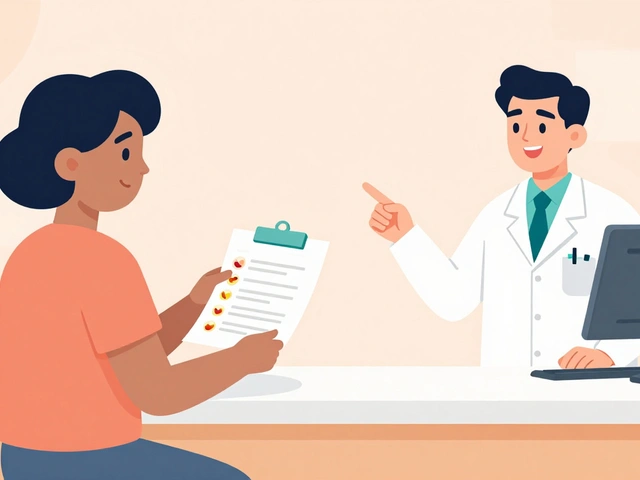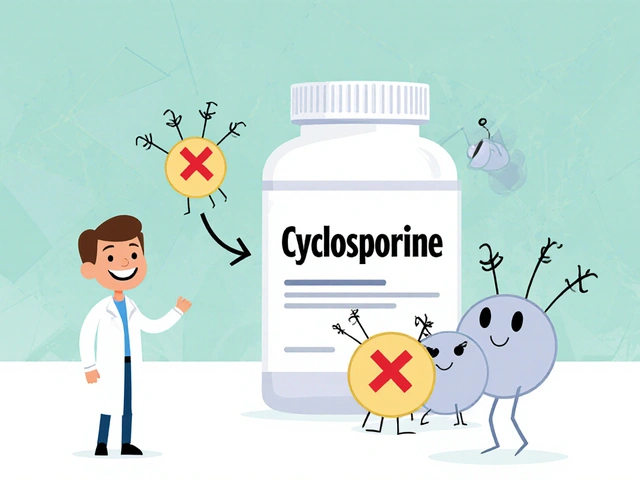
Nothing quite slaps you in the face like seeing three little letters—HIV—show up on a lab report. You feel blindsided. The word itself carries so much fear and stigma, even in 2025. But within minutes at the doctor’s office, you hear another word: Biktarvy. It sounds almost friendly compared to most medication names, but let’s be real—you want the truth, not a glossy pamphlet.
What is Biktarvy and How Does it Actually Work?
So, what exactly is Biktarvy? At its core, Biktarvy is a once-daily pill for treating HIV-1 in adults and children weighing at least 25 kg. It isn’t some wonder drug out of nowhere—it’s actually a combination of three meds in one: bictegravir, emtricitabine, and tenofovir alafenamide. These drugs are called antiretrovirals, and they work together to stop HIV from making copies of itself inside your cells. Think of HIV as a little criminal that sneaks into your CD4 cells (the ones that help your immune system fight off bugs), and Biktarvy is the bouncer that blocks the criminal from making copies and running wild to new cells.
Here’s where it gets interesting. Since 2018, more doctors in the U.S., Europe, and Australia have started prescribing Biktarvy as their go-to first-line treatment. Clinical studies, like the 2023 SWORD-4 trial, found that over 97% of people who started Biktarvy got their viral loads down to undetectable levels within six months. That’s massive—because ‘undetectable’ means you can’t pass HIV on sexually, and your immune system starts bouncing back.
But how does it compare with old-school HIV drugs? You used to see folks with kitchen counters jammed with bottles—morning pills, night pills, pills for side effects. Biktarvy strips all that chaos down to one small tablet. No complicated schedules. Just a single pill at the same time every day. That’s a game-changer for anyone struggling to keep up with a routine, especially if you’re traveling, busy, or prone to forgetting mealtimes (raise your hand if you’re in that club).
One important heads-up: Biktarvy isn’t a cure for HIV. The virus can’t be fully flushed out of your system yet. But living with undetectable HIV really does put life almost back to normal for most people. You don’t have to announce your meds to every houseguest. You can keep loving and working and dreaming with your dignity intact.
Still, there are rules. You have to take it every day, without missing doses. If you let your guard down too many times in a row, HIV can sneak back and start multiplying again—sometimes, with new tricks to dodge the meds you’ve relied on. That’s why adherence is constantly hammered home by every doctor, every time. There’s an app for tracking now, but if apps aren’t your thing, plenty of people just set an alarm or stash a spare pill at work or in their wallet “just in case.”
If you hear someone say Biktarvy is “new,” they’re not wrong, but it’s been tested with real-world data for years now. Over two million people have started it since its launch. The consensus? For most, it’s smooth sailing—little drama, minimal fuss. If you want to get into the pharmaceutical weeds, remember this: bictegravir is the anchor drug in the trio. It’s what blocks the integrase enzyme, stopping HIV’s blueprint from being pasted into your DNA. The other two (emtricitabine and tenofovir alafenamide) block reverse transcriptase, so HIV can’t copy its genes after breaking in. It’s like locking the front door and jamming the copy machine at the same time. Makes life a whole lot harder for the virus.
Still, you can’t ignore the discussion about drug resistance—especially on Reddit, Twitter, and real-world support groups. The scary stuff happens when people miss doses for days at a time, letting their viral load creep up. Eventually, the virus “learns” what your meds look like and mutates around them. But the good news: as of this year, documented resistance against Biktarvy itself is extremely rare. According to Dr. Jennifer Howell at the CDC, “So far, we have not seen integrase inhibitor resistance emerge as a real problem in patients who adhere.”
It's nice to know pharmaceutical companies finally listened to the real-world needs of people living with HIV. Instead of bombarding you with a dozen pills, they've packed everything you need into one easy-to-swallow daily dose. No need to obsess over complicated meal timings, either—just pop it with or without food. You don't have to create huge lifestyle changes. You stay you. Even better, there’s a huge support base online, with folks sharing all sorts of tips and little hacks. Some use pill organizers, some hide sticky notes on their bathroom mirror. You’ll find what works for you.

Side Effects, Interactions, and Real-World Experience on Biktarvy
You’ve probably heard that every HIV med comes with a “catch.” So what are the real side effects—and are they as bad as the internet rumors claim?
The most common ones with Biktarvy are pretty tame for most people—think diarrhea, a touch of nausea, or maybe a headache. Headaches in the first few weeks are so frequent that most people just keep some Tylenol or Advil handy while their body adjusts. It usually passes. Some report weird dreams or mild dizziness in the early days. Still, it’s nothing compared to the old-school side effects (lipodystrophy, neuropathy, brutal nightmares) people had to put up with years ago.
There’s talk about kidney and liver issues, and for some, that’s a real concern—especially if you already have trouble with those organs. Doctors run baseline tests before and after starting Biktarvy, just to spot trouble early. For most people with fairly healthy kidneys, though, the risk stays low. If your creatinine levels or liver enzymes are off, your doc may suggest a different med. You don’t have to guess—labs will tell the story.
Let’s talk about weight. There’s genuine anxiety in the community about Biktarvy and weight gain. Numbers in the large “METRIC” study from 2022 showed people gained an average of 2–4 kilograms over two years after starting Biktarvy—not dramatic, but real. A few outliers gained more. Some folks shrug this off, others get mad (and rightfully so). If you’re worried, keep up with regular exercise and avoid ‘comfort eating’ that can sneak in around stress or depression. Drinking more water, sleep hygiene, and mindful eating can all help if weight creep worries you.
Drug interactions can trip people up, especially those who take supplements or other prescription meds. Biktarvy and antacids don’t really get along—think Tums, Maalox, or even iron or calcium supplements. Space them out by at least two hours, so they don’t block Biktarvy from being absorbed. St. John’s Wort is a no-go since it can lower medication levels in your blood too much. If your doctor says to add a new drug or over-the-counter supplement, say you’re on Biktarvy. They’ll know what might mess with your meds.
Pregnancy is another hot topic. In 2022, the Tsepamo study out of Botswana found no increase in birth defects in babies whose moms took Biktarvy during the first trimester. That’s huge, especially because women living with HIV are demanding data, not just reassurance. If you’re pregnant or plan to be, talk openly with your HIV doctor—there’s a way forward that works for both you and your baby.
The emotional side is just as real as the biological. The relief of having only one pill instead of half a dozen can’t really be overstated. People get their privacy back—they don’t have to label bathroom shelves or hide multiple bottles in travel bags. “After I switched, my anxiety about forgetting a dose totally dropped,” one user shared on TheBodyPro forum. Another says, “It feels like I’m in control again—not the virus.”
Here are some down-to-earth tips from people who’ve made Biktarvy a simple part of daily life:
- Use a phone alarm or reminder app. Even the most organized person can forget sometimes.
- If you miss a dose by a few hours, just take it when you remember. Don’t double up.
- Traveling soon? Ask your doc or pharmacy for a few extra pills in advance. Laws in some countries still require a letter or prescription backup—double check before you fly.
- Store the pill in a dry spot, not your humid bathroom. Biktarvy is stable but doesn’t love steamy rooms.
- Stay up-to-date with lab visits. Catching little changes early is easier to fix.
As for stigma, it’s shrinking, but not gone. Some skip doses out of fear a partner or roommate will see the bottle. There are on-the-go single-dose wrappers you can ask for—if privacy matters, it’s worth asking your pharmacist.
A good note from Dr. Paul Sax at Brigham and Women's Hospital:
"Biktarvy is now our first choice for newly diagnosed patients because of its high barrier to resistance and ease of use. Most people experience few, if any, side effects—all without compromising on efficacy."
Remember, your provider isn’t just someone to write the prescription. Build the relationship. If something feels off—headaches, upset stomach, mood swings—bring it up. There are alternatives if you need them. Nobody has to “tough it out” anymore just because the pamphlet says most people adjust fine. Your real-world experience matters.

Living Your Best Life on Biktarvy: What You Need to Know
There’s this funny myth that starting HIV meds means you have to live like you’re made of glass—no partying, no fun, no ‘real’ living. The truth with Biktarvy? Most people fall back into their old routines after the first month or two. You don’t have a neon sign over your head. You’re just someone taking a daily pill, like millions with high blood pressure or diabetes.
Diet? There’s nothing you have to avoid just because you’re on Biktarvy. No special meal plans, no weird ingredient lists. That said, try to eat regular, balanced meals—because your immune system needs all the help it can get. Don’t sweat the occasional burger or pizza, but getting enough fiber, protein, and water will help your energy stay up. Some research even hints at better mental clarity and emotional balance after people’s viral loads go undetectable—which makes you wonder just how much physical health and mental health really go hand-in-hand.
Sex life is another area where people feel stress. If you’re undetectable on Biktarvy, the U=U message (Undetectable = Untransmittable) still holds true in 2025. Every global health agency—and more importantly, long-term studies—confirm you cannot pass HIV sexually if your viral load is undetectable for at least six months. That’s not hype, that’s science. Still, old myths linger. If you’re seeing someone new, having the undetectable talk can be intimidating. There are great online guides (like at NAM aidsmap or TheBody.com) about the best ways to explain this in honest, simple terms. If you want a wingwoman—ask someone else living with HIV how they do it, or join a private support group.
Travel is more doable than ever. As of 2024, almost all countries allow entry for people on HIV meds, but some still demand proof you need them. Always carry your Biktarvy in the original pharmacy bottle when flying, and keep a copy of your prescription handy or even saved as a PDF on your phone, just in case airport staff ask weird questions. For travelers anxious about time zones, apps like Medisafe or even “old school” watch alarms can help you stick to your schedule so you don’t skip a dose on a long haul flight.
What happens if you need surgery, dental work, or get a bad cold? Don’t hide your HIV status from your healthcare provider—your safety comes first. Biktarvy typically plays nice with anesthesia, but always double-check your medication list with your doc. If you get really ill and can’t keep a pill down (vomiting or stomach flu), let your care team know. Missing a day or two isn’t the end of the world, but you don’t want to go longer without guidance. Rest, hydrate, and start again as soon as you’re able.
Mental health can take a hit when you start any new medication for a long-term virus. Some days you might feel invisible, other days hyper-aware. Know that you’re not alone—or weird—for feeling that way. It’s okay to reach out for support. Some people find one-on-one therapy helps, others like joining online groups. Either way, your feelings are valid.
If you ever want to explore switching, maybe because of side effects or a life change, don’t sweat it. The landscape for HIV meds keeps improving. There are more once-a-day options, even long-acting injectables that might be right down the road for you. But for now, Biktarvy’s become a favorite for a reason: it works, it’s easy, and it gives people back their freedom.
So, if you just heard “Biktarvy” for the first time today, here’s your honest lowdown. It’s one of the safest, most effective tools out there to treat HIV, help you live long, and keep you feeling normal (whatever normal means for you). Your life might look different in some ways, but you’re still you—not your diagnosis, not your pill bottle. If you’re considering Biktarvy or just started, you really don’t have to navigate the journey alone. The best tip? Trust yourself to ask questions, try things, and shape your life with HIV on your own terms. That’s how you win.




Joe bailey
August 5, 2025 AT 21:50Biktarvy changed my life. One pill. No more counting bottles. No more panic when I travel. I’ve been undetectable for 3 years now and honestly? I forget I’m on meds half the time. That’s the win.
Aaron Whong
August 5, 2025 AT 22:57The pharmacodynamics of Biktarvy represent a paradigmatic shift in antiretroviral therapy-integrase inhibition coupled with nucleoside reverse transcriptase blockade creates a synergistic resistance barrier that fundamentally alters the host-pathogen equilibrium. The clinical efficacy metrics are statistically robust, but the ontological implications for patient autonomy are even more profound. We’re not just treating a virus; we’re restoring epistemic agency.
Cynthia Springer
August 7, 2025 AT 17:41I’ve been on Biktarvy for 18 months. The nausea lasted about two weeks. The dreams? Still weird. But I’ve never felt more stable. I’m curious-has anyone experienced brain fog or memory lapses early on? Not sure if it’s the med or just anxiety.
Rachel Whip
August 8, 2025 AT 11:35For anyone new to this: take it at the same time every day, even if it’s 2am. Set three alarms if you have to. I use a pill case with days of the week and keep one in my wallet. Missed a dose? Take it within 12 hours. Don’t double up. And yes, avoid Tums within two hours. I learned that the hard way. You’re not alone in this.
Micaela Yarman
August 8, 2025 AT 16:42As a public health advocate with over a decade of experience in HIV advocacy, I must emphasize that the normalization of single-pill regimens like Biktarvy represents a monumental sociocultural milestone. The reduction in stigma is not incidental-it is directly correlated with therapeutic simplification. The data is unequivocal: when patients experience minimal disruption to daily life, adherence increases, transmission rates decline, and societal perception evolves. This is not merely pharmacology; it is social justice in capsule form.
mohit passi
August 10, 2025 AT 00:35bro its just one pill a day 🤷♂️ why are we overcomplicating this? i take mine with coffee and forget about it. if you can brush your teeth, you can take Biktarvy. 🌞💊
Marissa Coratti
August 10, 2025 AT 14:32While the clinical efficacy of Biktarvy is well-documented in peer-reviewed literature, including the SWORD-4 and METRIC trials, it is imperative to acknowledge the nuanced psychosocial dimensions that underpin long-term adherence. The psychological burden of chronic illness, compounded by internalized stigma, often manifests as non-adherence not through negligence, but through existential fatigue. Therefore, while the pharmacokinetics are elegant, the human experience demands a multidimensional care model-one that integrates mental health support, peer mentorship, and structural accessibility, not merely pharmaceutical convenience.
Amanda Wong
August 10, 2025 AT 19:17Let’s be real-this is just Big Pharma’s way of locking you in. They know you’ll never switch because they made it too convenient. And the weight gain? They downplay it. My cousin gained 30 pounds in a year. Now she’s on metformin. This isn’t freedom-it’s a slow trap dressed up as a miracle.
Stephen Adeyanju
August 12, 2025 AT 00:06One pill sounds great until you realize you’re paying $2000 a month for it and your insurance keeps denying it. I’ve been on hold for 45 minutes every week trying to get prior auth. This isn’t a miracle. It’s a corporate slogan with a side of financial trauma
james thomas
August 13, 2025 AT 23:06They say it’s safe but did you know the tenofovir in it was originally developed for cancer? And they skipped phase 4 trials for some populations. I read a paper that said it could affect mitochondria long term. They don’t tell you that. You’re basically a lab rat with a prescription
Deborah Williams
August 14, 2025 AT 10:09Wow. So we’re all just supposed to be grateful now? That the pharmaceutical industry finally decided to make a pill that doesn’t turn you into a zombie? How noble. Meanwhile, the people who can’t afford it are still getting kicked out of housing because they’re ‘high risk.’ This is the same system that let people die in the 80s. Don’t make me vomit with your feel-good narrative.
Kaushik Das
August 15, 2025 AT 10:19Man this hit different. I’m from Delhi and my doctor here didn’t even know Biktarvy existed till last year. We were stuck on older meds with side effects that felt like punishment. Now I’ve got my own little pill, and I’m not hiding it anymore. Took me 8 years to get here. You guys are lucky. 🙏